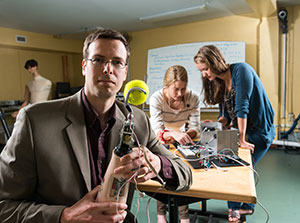Research team receives up to 2 5 million from DARPA to evaluate prosthetic limb technology
Author: Communications
Posted on Feb 9, 2015
Category: UNB Fredericton
University of New Brunswick researcher, Jon Sensinger, is part of research team that has won a $2.5 million contract from the Defense Advanced Research Projects Agency (DARPA). The contract was awarded through DARPA’s new Hand Proprioception and Touch Interfaces (HAPTIX) program, which aims to deliver naturalistic sensations to amputees and enable better control over their prosthetic limbs through direct connections to users’ nervous systems. 
The research team intends to develop a suite of outcome metrics for advanced prosthetic limbs that are clinically relevant and rooted in cutting-edge science. These metrics could potentially change the way that prosthetic devices are currently evaluated.
Prosthetic limb technology has undergone significant advancements in recent years, but there is currently no standardized set of metrics to evaluate these technologies. This lack of information leaves insufficient evidence to guide research and medical decision-making and hinders the ability to communicate benefits to patients and demonstrate improved outcomes to insurance payers.
Sensinger, who is a UNB electrical engineering professor and associate director of UNB’s Institute for Biomedical Engineering, says the funding will allow their team to formulate outcome measures not only in terms of the task, but in terms of the capabilities of the person's body and brain.
“We are devising a framework that can use simple math equations and experiments to extract not only what the person is doing, but what they are thinking and the control choices they are making in real-time.”
According to Sensinger, this framework could also extend to other applications including exoskeletons, car interfaces, gaming interfaces, and others.
“We hope this will be a major catalyst in compelling several large industries to establish research programs in New Brunswick to evaluate and improve their industries using these approaches, as well as furthering existing industrial collaborations with groups such as B-Temia's Centre for Research in Dermoskeletics,” said Sensinger.
In Phase I of the award period (18 months), the team intends to develop a battery of validated functional metrics for bi-directionally integrated advanced prosthetic limb systems. All of the team leaders are active research scientists operating within applied clinical environments and their individual teams plan to operate in parallel based on each group’s experience, skills and expertise.
If successful, the grant could be renewed for subsequent Phases II and III, with a total award amount of up to $2.5 million.
The research team is being led by Paul Marasco of Cleveland Clinic’s Lerner Research Institute, Lerner Research Institute’s Department of Biomedical Engineering and the Louis Stokes Cleveland VA Medical Center. Jacqueline Hebert, of the University of Alberta, is also a key leader on the research team along with Sensinger.
Editor’s Note: Cleveland Clinic News Service is available to provide broadcast-quality interviews and B-roll upon request.
Media Contacts:
Natasha Ashfield, 506.447.3012, natasha.ashfield@unb.ca
Laura Ambro, 216.636.5876, ambrol@ccf.org
